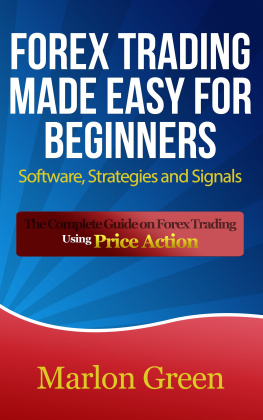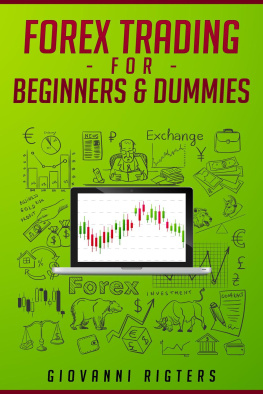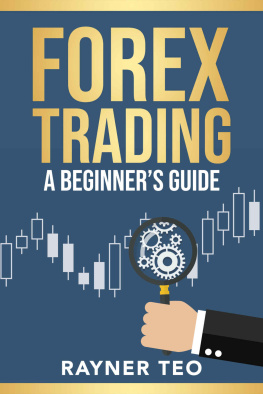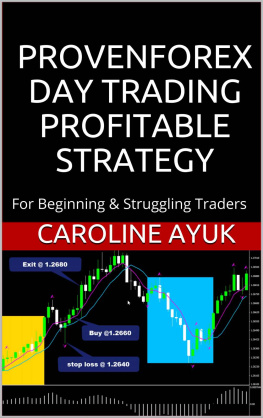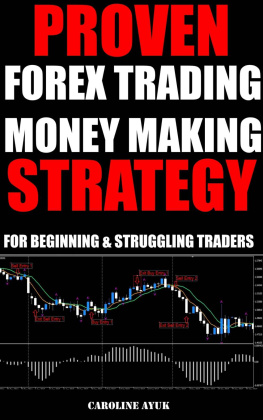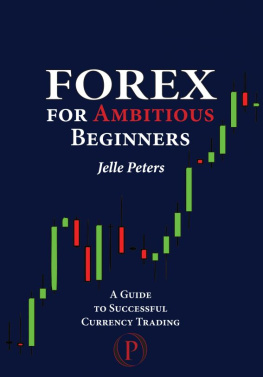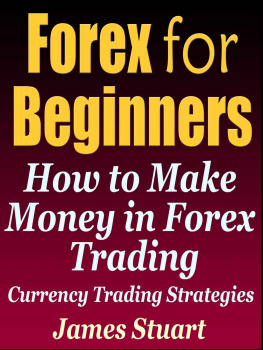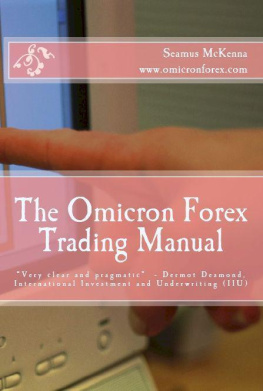Forex Trading Made Easy For Beginners: Software, Strategies and Signals
The Complete Guide on Forex Trading Using Price Action
By: Marlon Green
PUBLISHERS NOTES
Disclaimer
This publication is intended to provide helpful and informative material. It is not intended to diagnose, treat, cure, or prevent any health problem or condition, nor is intended to replace the advice of a physician. No action should be taken solely on the contents of this book. Always consult your physician or qualified health-care professional on any matters regarding your health and before adopting any suggestions in this book or drawing inferences from it.
The author and publisher specifically disclaim all responsibility for any liability, loss or risk, personal or otherwise, which is incurred as a consequence, directly or indirectly, from the use or application of any contents of this book.
Any and all product names referenced within this book are the trademarks of their respective owners. None of these owners have sponsored, authorized, endorsed, or approved this book.
Always read all information provided by the manufacturers product labels before using their products. The author and publisher are not responsible for claims made by manufacturers.
Digital Edition
Manufactured in the United States of America
WHAT YOU WILL LEARN IN THIS BOOK
How This Book Will Help You and Why
Are you interested in learning what Forex Trading really entails? If you do then this book is perfect for you. It not only defines Forex trading in a way that is easy to understand, it also outlines the various methods that are involved in this form of trading.
The book also explains how this form of trading can be used to make money and highlights some of the things that must be avoided.
TABLE OF CONTENTS
DEDICATION
This book is dedicated to my dad Nathaniel. He taught me how to trade and guided me through until now I am much more confident when I do it. He is all about family and has shown me by example how you have to do what you must to support your family.
CHAPTER 1- A HISTORY OF FOREX
If you're like many people, you've probably heard the term "Forex" on the news or seen it in one of those ubiquitous, mildly-irksome banner ads found across the Internet, but you may have little detailed knowledge of this somewhat esoteric topic. The foreign exchange market, frequently referred to in truncated form as the "Forex market", "FOREX market", or "FX market", is, unbeknownst to many outside of finance, the largest financial market on the planet. Approximately four trillion U.S. dollars worth of currency is exchanged in this market every day, more value than that exchanged in the U.S. stock, bond, and T-bill markets combined.

Part of the reason the Forex market has limited visibility to those outside the world of finance is that, in contradistinction to other financial markets, the Forex market lacks a centralized exchange akin to the New York Stock Exchange (NYSE) or the Chicago Board Options Exchange (CBOE). The Forex market comprises a worldwide network of banks, other financial institutions, and independent Forex traders, all engaged in the trade of national and supranational currencies. A distinguishing trait of the Forex market is that it remains open and active 24 hours a day throughout the workweek, and since, as it were, the sun therefore never sets on the Forex market, it's also the most liquid of global markets.
In the past, access to the Forex market was only available to banks and other sizeable financial institutions, but as in so many other sectors, digital and information technology have leveled the playing field with respect to the Forex market. Forex trading is now readily available to all, from the traditional large players on down to money managers and individual traders. Accordingly, the past few years have seen many new traders enter this exciting, dynamic market. Getting started in Forex trading is now as simple as navigating to a Forex website and opening an account. Mastering Forex trading, however, is not necessarily any easier than it has ever been, as the market is still riddled with potential landmines for novices incognizant of their exposure to risk. Margined Forex trading, for example, is incredibly jeopardous and only appropriate for traders capable of absorbing the potential losses involved.
Because a brokerage account may offer the individual trader the capacity to trade currencies on a highly-leveraged basis, at values up to hundreds of times an account's underlying equity, this equity can potentially be entirely wiped out by swings in value of as small as a single percentage point, and the risk is only compounded in the current environment, wherein the euro and other major currencies have shown unusual volatility as a result of ongoing global macroeconomic uncertainties. Speculation in the Forex market should therefore only be exercised with "risk" capital, i.e., money that the investor can afford to lose.
Trading foreign currencies in the Forex market is not at all similar to trading currencies in the futures market and is in many ways easier than trading stocks, commodities, and especially options. Indeed, practically all adults the world over are indirectly participating in the Forex market in a very real sense already. The simple possession of currency makes one an investor in that currency and affects its strength. The holding of renminbi, euros, or yen represents de facto decisions not to hold the currencies of other nations or regions.
Similarly, the purchase of equities and the holding of liquid cash in bank accounts or money-market mutual funds all point to faith in, or the fiat value of, the currencies in which those investments are denominated. Forex investing proper involves calculated gambles on how these and many other decisions by actors across the globe are likely to influence the relationships between different currencies. Changing currency values and the consequent fluctuations in exchange rates are the source of opportunity as well as risk in this market. As such, recent currency and thus exchange-rate volatility have led to considerable returns for Forex investors who have taken the right positions before and during, e.g., revolutions in the Arab world or anti-austerity riots in Europe.
To give an illustrative example, an investor with 20,000 pounds sterling (GBP) might trade all of these for Canadian dollars (CAD) when the exchange rate is 0.5 GBP to the CAD. He would then have 40,000 CAD. If the value of the CAD then increased against the GBP, as was the case in the years following the global economic downturn of 2008, he could then sell his CAD for GBP and end up with more pounds sterling than he had at the beginning.
Between these exchanges, our Forex trader would have kept track on a regular basis of exchange rates in the format "CAD/GBP last 0.653499", or something similar. This sample readout simply indicates that the last time an exchange between these currencies was recorded on the market; the rate was 0.653499 pounds sterling for a Canadian dollar. The first currency listed, here the CAD, is termed the "base" currency, and the second, the GBP, is called the "quote" or "counter" currency.
Forex trading is fundamental to the global economy as anyone who has ever exchanged currencies while traveling will be aware. So long as currencies continue to differ between countries (or at least regions), foreign currency exchange will be a prerequisite for the trade in products and services across those currency zones, and such international trade has only increased with advances in communication and transportation technology and as the infrastructure of globalization has continued to expand apace until the speculative eventuality of a unitary global.

